
Journal of Mathematical Physics Analysis Geometry
Scope & Guideline
Bridging the Gap Between Theory and Application
Introduction
Aims and Scopes
- Mathematical Analysis and Differential Equations:
The journal emphasizes the study of various types of differential equations, including elliptic, parabolic, and fractional types, often focusing on their solvability, stability, and qualitative behavior. - Geometry and Topology:
Research on geometric structures, including Ricci solitons, warped products, and the interplay between geometry and analysis, is a core aspect of the journal's offerings. - Functional Analysis and Operator Theory:
The journal covers advancements in functional analysis, particularly in the context of operator theory, spectral analysis, and the study of frames and bases in Hilbert spaces. - Mathematical Physics:
A significant portion of the journal is dedicated to the intersection of mathematics and physics, exploring topics such as quantum mechanics, statistical mechanics, and the mathematical foundations of physical theories. - Control Theory and Variational Methods:
The journal publishes works related to optimal control problems, variational inequalities, and associated mathematical techniques, reflecting a strong interest in applied mathematics.
Trending and Emerging
- Fractional Calculus and Differential Equations:
There is a noticeable increase in research related to fractional derivatives and their applications to various types of differential equations, indicating a growing interest in non-local phenomena. - Geometric Analysis:
Recent publications highlight a surge in geometric analysis, particularly studies involving Ricci solitons and curvature properties, which are gaining traction in both mathematics and theoretical physics. - Stochastic Processes and Random Matrices:
The exploration of stochastic processes, particularly in the context of random matrices and their statistical properties, has become more prominent, reflecting broader trends in mathematical physics. - Control Theory Applications:
An increasing number of papers are focused on control theory, particularly regarding its application to partial differential equations and variational problems, indicating a shift towards applied mathematics. - Numerical Methods and Computational Geometry:
The journal is also seeing a rise in the publication of works involving numerical methods and computational approaches to geometric problems, which are essential for practical applications in physics.
Declining or Waning
- Classical Geometry:
Interest in classical geometric topics, such as traditional studies of curves and surfaces, seems to be decreasing, with fewer papers addressing these subjects directly. - Elementary Number Theory:
Although foundational, research in elementary number theory appears less frequently in recent publications, possibly overshadowed by more complex mathematical frameworks. - Static Solutions to Differential Equations:
There seems to be a waning emphasis on the exploration of static or equilibrium solutions of differential equations, as the journal shifts towards dynamic and evolutionary problems.
Similar Journals

Symmetry Integrability and Geometry-Methods and Applications
Empowering Scholars through Open Access KnowledgeSymmetry Integrability and Geometry-Methods and Applications is a prominent open-access journal published by the NATIONAL ACADEMY OF SCIENCES OF UKRAINE, INSTITUTE OF MATHEMATICS, dedicated to advancing research in the fields of Analysis, Geometry and Topology, and Mathematical Physics. Since its inception in 2005, the journal has provided an esteemed platform for scholars from around the globe to share their innovative findings and methodologies, contributing to our understanding of complex mathematical concepts. With an impressive Q2 ranking in all three mathematical categories as per the 2023 Scopus rankings, the journal positions itself as a key resource for researchers seeking high-quality, peer-reviewed content. As a fully open-access publication, it ensures that research is readily available to a wide audience, fostering collaboration and knowledge exchange in the mathematical sciences.
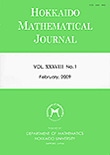
Hokkaido Mathematical Journal
Advancing mathematical frontiers through rigorous research.Hokkaido Mathematical Journal, published by Hokkaido University, Department of Mathematics, stands as a pivotal platform for scholarly discourse in the field of mathematics. Established in 1972, this peer-reviewed journal has consistently contributed to the advancement of mathematical research, covering a wide spectrum of topics within the discipline. With its current ranking in the third quartile (Q3) among miscellaneous mathematics journals, it offers valuable insights and findings that cater to both established researchers and budding mathematicians alike. The journal is accessible through traditional subscription, fostering a community that values rigorous theoretical exploration and applied mathematical methods. As it approaches its convergence year in 2024, Hokkaido Mathematical Journal remains essential for those dedicated to pushing the boundaries of mathematical knowledge and innovation in Japan and beyond.
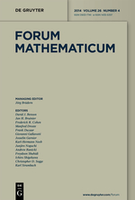
FORUM MATHEMATICUM
Illuminating the Path of Mathematical InquiryFORUM MATHEMATICUM, published by WALTER DE GRUYTER GMBH, is a distinguished academic journal based in Germany, known for its significant contributions to the field of mathematics. With an ISSN of 0933-7741 and an E-ISSN of 1435-5337, the journal features comprehensive studies ranging from applied mathematics to diverse mathematical disciplines. Having maintained a commendable presence since 1989, FORUM MATHEMATICUM has achieved notable classification rankings, including Q2 in Applied Mathematics and Q1 in miscellaneous Mathematics as of 2023. Additionally, it holds a Scopus rank within the top 60th percentile in General Mathematics, making it a prominent platform for researchers and professionals seeking rigorous analysis and innovative methodologies in mathematics. While the journal does not currently offer open access, its rich content is pivotal for advancing mathematical theory and applications, appealing to students and seasoned academics alike.

RUSSIAN JOURNAL OF MATHEMATICAL PHYSICS
Elevating Scholarship in the Realm of Mathematical PhysicsRUSSIAN JOURNAL OF MATHEMATICAL PHYSICS is a premier academic journal published by PLEIADES PUBLISHING INC, dedicated to advancing the fields of mathematical physics and statistical and nonlinear physics. With a commendable Impact Factor in the Q2 category for both disciplines as of 2023, the journal serves as an essential platform for researchers, professionals, and students to explore innovative theoretical and applied aspects of these fields. Established between 1996 and 1997, and resuming publication in 1999 through to 2024, the journal reflects a long-standing commitment to disseminating high-quality scholarship. The Scopus rankings place it at a competitive position, ranking #23 out of 85 in Mathematical Physics and #26 out of 62 in Statistical and Nonlinear Physics, showcasing its relevance and influence. While currently not offering open access, the journal’s audience is encouraged to engage with its substantive research and contribute to the ongoing dialogue in mathematical physics, fostering a deeper understanding of complex physical phenomena.

Mediterranean Journal of Mathematics
Fostering Dialogue and Discovery in Mathematical SciencesThe Mediterranean Journal of Mathematics, published by SPRINGER BASEL AG, is a prominent platform dedicated to the advancement of mathematical research and education. Since its inception in 2004, this journal has been pivotal in disseminating high-quality research across various fields of mathematics, currently holding a notable Q2 ranking in the miscellaneous mathematics category as of 2023. With its ISSN 1660-5446 and E-ISSN 1660-5454, the journal enjoys a respected position in the academic community, evident by its Scopus rank of 129 out of 399 in General Mathematics, placing it in the 67th percentile. While primarily a subscription-based journal, it remains committed to providing a comprehensive resource for researchers, professionals, and students, fostering dialogue and exploration within the mathematical sciences. The Mediterranean Journal of Mathematics, based in Basel, Switzerland, continues to contribute significantly to the evolution of mathematical theory and practice, marking its relevance as we approach its 20th anniversary in 2024.
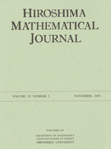
Hiroshima Mathematical Journal
Exploring the Depths of Algebra, Analysis, and BeyondThe Hiroshima Mathematical Journal, published by Hiroshima University, Graduate School of Science, serves as a prominent platform for disseminating high-quality research in the field of mathematics. Established in 1959, the journal has been an integral part of the mathematical community, focusing on areas such as Algebra, Number Theory, Analysis, and Geometry and Topology. Although currently classified in Q4 quartile rankings within its categories, the journal is committed to advancing mathematical knowledge and fostering scholarly dialogue. Its accessibility, combined with its long-standing history, makes it an essential resource for researchers, professionals, and students dedicated to exploring and enhancing the mathematical sciences. For those interested in contributing or accessing cutting-edge research, the Hiroshima Mathematical Journal continues to uphold its mission of excellence in mathematical scholarship.
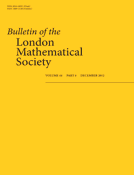
BULLETIN OF THE LONDON MATHEMATICAL SOCIETY
Championing Scholarly Discourse in the Mathematical SciencesThe BULLETIN OF THE LONDON MATHEMATICAL SOCIETY, published by Wiley, is a distinguished journal that serves as a vital resource in the field of mathematics. With its ISSN 0024-6093 and E-ISSN 1469-2120, this journal has consistently provided a platform for innovative research and scholarly discourse since its inception in 1969. Recognized for its quality, it currently holds an impressive Q1 ranking in the mathematics category, a testament to its significance in disseminating influential findings and trends in the mathematical sciences. Researchers and practitioners can rely on the BULLETIN for its comprehensive coverage of both theoretical and applied mathematics, which caters to a diverse audience ranging from professionals to students alike. Though it does not currently offer Open Access options, its articles can be accessed through institutional subscriptions, ensuring that significant works reach the academic community effectively. With contributions that span over five decades, the journal continues to shape mathematical research and inspire future advancements in the discipline.
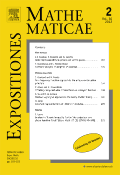
EXPOSITIONES MATHEMATICAE
Fostering Original Research in Diverse Mathematical FieldsEXPOSITIONES MATHEMATICAE, published by Elsevier GmbH, stands as a significant journal in the realm of mathematics, catering primarily to researchers, professionals, and students. With an ISSN of 0723-0869 and an E-ISSN of 1878-0792, this journal has made its mark in the academic community, boasting a Q2 classification in the miscellaneous mathematics category for 2023, illustrating its prominence within its field. The journal addresses a diverse scope of mathematical topics, encouraging the publication of original research and innovative theories while maintaining rigorous academic standards. As it converges from 2004 to 2024, EXPOSITIONES MATHEMATICAE continues to be an essential resource for advancing mathematical knowledge and fostering scholarly communication, despite being a non-open-access publication. Its location in Munich, Germany further anchors it within a rich intellectual tradition, providing accessibility for the mathematical community worldwide.
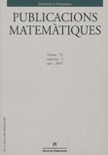
PUBLICACIONS MATEMATIQUES
Cultivating Excellence in Mathematical ScholarshipPUBLICACIONS MATEMATIQUES is a prestigious academic journal published by Universitat Autònoma de Barcelona, specializing in the diverse field of mathematics and its applications. With an esteemed Q1 ranking in Mathematics (miscellaneous) for 2023, this journal holds a significant position in the mathematical community, reflecting a commitment to high-quality research that spans both theoretical and practical aspects of mathematics. Although it operates without an Open Access model, it remains accessible to a global audience, featuring contributions that range from pure mathematical theories to interdisciplinary applications. Based in Spain, its influence and reach extend internationally, making it a vital resource for researchers, professionals, and students alike who seek to stay informed and engaged with cutting-edge developments in mathematics. The journal's continuous publication since 2002 further underscores its role in advancing mathematical research and fostering scholarly dialogue.

Analysis and Mathematical Physics
Empowering Scholars with Rigorous Research ContributionsAnalysis and Mathematical Physics is a distinguished scholarly journal dedicated to advancing the fields of algebra, analysis, and mathematical physics. Published by Springer Basel AG, this journal serves as a pivotal platform for researchers and practitioners to disseminate innovative findings and theoretical advancements. With an impact factor that underscores its significance, it ranks in the Q1 category for Algebra and Number Theory and Q2 for both Analysis and Mathematical Physics as of 2023. The journal's robust standing is further reflected in its impressive Scopus rankings, placing it within the top 15% in Algebra and Number Theory and 32nd in Mathematical Physics. Notably, the journal fosters open dialogue across various mathematical disciplines, aiming to connect theory with practical applications. Through its thoughtful selection of rigorous research contributions, Analysis and Mathematical Physics remains an essential resource for academic scholars, industry professionals, and students striving to deepen their understanding and engage with complex mathematical concepts.